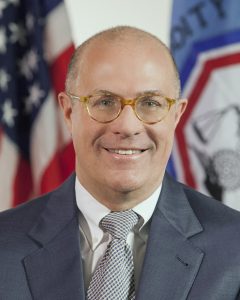Latest news about Bitcoin and all cryptocurrencies. Your daily crypto news habit.

Jay Clayton, the chairman of the United States Securities and Exchange Commission (SEC), and J. Christopher Giancarlo, the chairman of the United States Commodity Futures Trading Commission (CFTC), have co-authored an opinion piece recently published by The Wall Street Journal. The article outlines a number of perceived problems facing the cryptocurrency sphere from the perspective of market regulators, in addition to discussing whether the prevailing regulatory norms are applicable to the virtual currency economy.
Also Read: CFTC Files Against ‘My Big Coin’ for Scamming $6 Million USD
“Caution is Merited”
 The WSJ article describes distributed ledger technology (DLT) as comprising “the advancement that underpins an array of new financial products, including cryptocurrencies and digital payment services.” The officials state that “Many have identified DLT as the next great diver of economic efficiency,” adding that “some have even compared it to productivity-driving innovations such as the steam engine and personal computer.”
The WSJ article describes distributed ledger technology (DLT) as comprising “the advancement that underpins an array of new financial products, including cryptocurrencies and digital payment services.” The officials state that “Many have identified DLT as the next great diver of economic efficiency,” adding that “some have even compared it to productivity-driving innovations such as the steam engine and personal computer.”
The officials state the cryptocurrencies were initially promoted as “a payment-facilitation alternative to traditional currencies such as the dollar and the euro.” Now, however, “their purported utility as an efficient medium of exchange” comprises “a distant secondary characteristic,” overshadowed by their current promotion and employment as “investment assets.”
The recent explosion of interest in cryptocurrencies is compared to the over-exuberant bullishness that accompanies the dot-com bubble of the nineteen nineties. The article states that “Countless companies chased the dot-com promise, yet only a fraction survived,” adding that “Fewer still provided their investors with life-changing returns.” Of cryptocurrencies, the authors assert that “Experience tells us that while some market participants may make fortunes, the risks to all investors are high,” adding that “Caution is merited.”
Officials Hope Not to Discourage “Investments in Innovation”
 Jay Clayton, Chairman of the SEC
Jay Clayton, Chairman of the SEC
The article states that “Earlier this month, the collective market capitalization of cryptocurrencies topped $700 billion,” with direct investment from U.S. investors comprising a “significant” share of the market cap. The officials note that “as market regulators,” their job requires that they “set and enforce rules that foster innovation while promoting market integrity and confidence.”
Their warning, the authors insist, should not be construed as “a statement against investments in innovation,” emphasizing that America’s “regulatory efforts should embrace [innovation].” It is argued, however, that a “substantial “portion of “DLT-related market activity shows little or no regard to our proven regulatory approach.” The officials claim that many platforms through which cryptocurrencies are exchanged are “based offshore,” adding that “none are registered with the Commodity Futures Trading Commission or the Securities and Exchange Commission.”
Regulatory Amendments Needed
 The article advocates that policy-makers revisit the pertinent regulatory apparatus’ imposed on business operating with cryptocurrencies. The officials assert that “Many of the internet-based cryptocurrency-trading platforms have registered as payment services and are not subject to direct oversight by the SEC or the CFTC,” as question the “effective[ness] and efficien[cy]” or the corresponding regulatory frameworks “for the digital era.”
The article advocates that policy-makers revisit the pertinent regulatory apparatus’ imposed on business operating with cryptocurrencies. The officials assert that “Many of the internet-based cryptocurrency-trading platforms have registered as payment services and are not subject to direct oversight by the SEC or the CFTC,” as question the “effective[ness] and efficien[cy]” or the corresponding regulatory frameworks “for the digital era.”
The officials also point to a lack of clarity regarding the regulatory jurisdiction of U.S authorities, arguing that while “In some areas, federal authority to police cryptocurrencies is clear […] In other areas, […] federal authority is murkier.”
The Launch of Bitcoin Futures Expands CFTC’s Regulatory Mandate Regarding Cryptocurrencies
 J. Christopher Giancarlo, Chairman of the CFTC
J. Christopher Giancarlo, Chairman of the CFTC
The article also discusses the recent listing of bitcoin futures products by “two of the largest CFTC-regulated exchanges,” CBOE, and CME. The authors state that “Although the exchanges are permitted to ‘self-certify’ and commence trading futures products without CFTC approval,” significant time was spent “engaging with CFTC staff” in order to develop and “implement risk-mitigation and oversight measures.” The officials assert that as a consequence, the CFTC has “gained oversight over the U.S. bitcoin futures market and access to data that can facilitate the detection and pursuit of bad actors in underlying spot markets.” The piece also states that “The SEC is devoting a significant portion of its resources to the ICO market,” emphasizing that “The SEC will vigorously pursue those who seek to evade the […] requirements of our securities laws.”
Ultimately, the officials recognize that the cryptocurrency “markets are new, evolving and international,” and as such demand a “nimble and forward-looking” regulatory response. The article concludes by conceding that “[DLT] may, in fact, be the next great disruptive and productivity-enhancing economic development,” that is “likely to be followed by many more life-changing innovations.”
What is you response to Jay Clayton and J. Christopher Giancarlo’s letter on cryptocurrencies and regulation? Share your thoughts in the comments section below!
Images courtesy of Shutterstock
At news.Bitcoin.com all comments containing links are automatically held up for moderation in the Disqus system. That means an editor has to take a look at the comment to approve it. This is due to the many, repetitive, spam and scam links people post under our articles. We do not censor any comment content based on politics or personal opinions. So, please be patient. Your comment will be published.
The post Chairmen of SEC and CFTC Co-Author Article on Crypto Regulations appeared first on Bitcoin News.
Disclaimer
The views and opinions expressed in this article are solely those of the authors and do not reflect the views of Bitcoin Insider. Every investment and trading move involves risk - this is especially true for cryptocurrencies given their volatility. We strongly advise our readers to conduct their own research when making a decision.